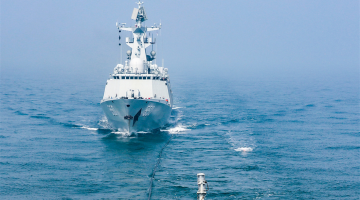The US Pacific fleet's guided missile destroyer USS McCampbell and the USNS Walter S.Diehl transited through the Taiwan Straits on Thursday. This is the first time that US warships passed through the Taiwan Straits this year, and the third action of such kind since October. Such high frequency has been rare in recent years.
The purpose of US warships is to flex their geopolitical muscle. The US on Thursday claimed that the transit "demonstrates the US commitment to a free and open Indo-Pacific," but such "beautiful" rhetoric entails obvious provocation.
The hostile gesture of the US will diminish mutual trust between China and the US. Chinese society generally holds a fair impression of the US, but such provocation will only tarnish the US image.
China will find the US action irritating, but such actions can never deter China. With China's military strength increasing, the deterrence that US warships can have on China by passing the Taiwan Straits has almost vanished.
Be it in the Taiwan Straits or the South China Sea where the US advocates its so-called freedom of navigation, the US military can hardly build any trust from regional countries, because the US moves have intensified tensions. No one in the region believes that the US military could awe the Chinese mainland, and more and more people worry that the US action will lead to regional geopolitical turbulence.
Even within Taiwan, there have been an increasing number of people who worry that growing tensions in the Taiwan Straits may jeopardize Taiwan's interests. Even the "Taiwan independence" forces do not believe the US military can threaten the mainland.
Each time a US warship passes through the Taiwan Straits or Chinese islands in the South China Sea, warships from the Chinese mainland will keep them under watch. Once US ships enter within 12 nautical miles of the islands, or US carrier-based planes take off when its warships pass through the Taiwan Straits, the Chinese PLA will intensify its surveillance, leading to more confrontations and risks.
Last September, US warships entered waters off China's islands and reefs in the South China Sea and were warded off by China's warships. Later, the US accused China of provoking it, but the fact is that US warships keep flexing their muscles in China's coastal areas, and the Chinese army is bound to demonstrate Chinese sovereignty and national determination.
That US warships and planes keep provoking in China's coastal areas will obviously increase the possibility of a military clash between the two. The moves by the US military will not only worsen strategic understanding between the two militaries, but also increase the difficulty of the front-line troops of the two countries to stay tactically secure. From a long-term perspective, US war games will become the largest source of risks that will be hard to manage between Beijing and Washington. If the US does not intend to provoke a strategic confrontation with China, or increase the risk of military clashes with China, it should refrain from staging military provocation in China's coastal areas. The US should take the initiative to reduce its confrontational acts and try its best to manage the risks.









